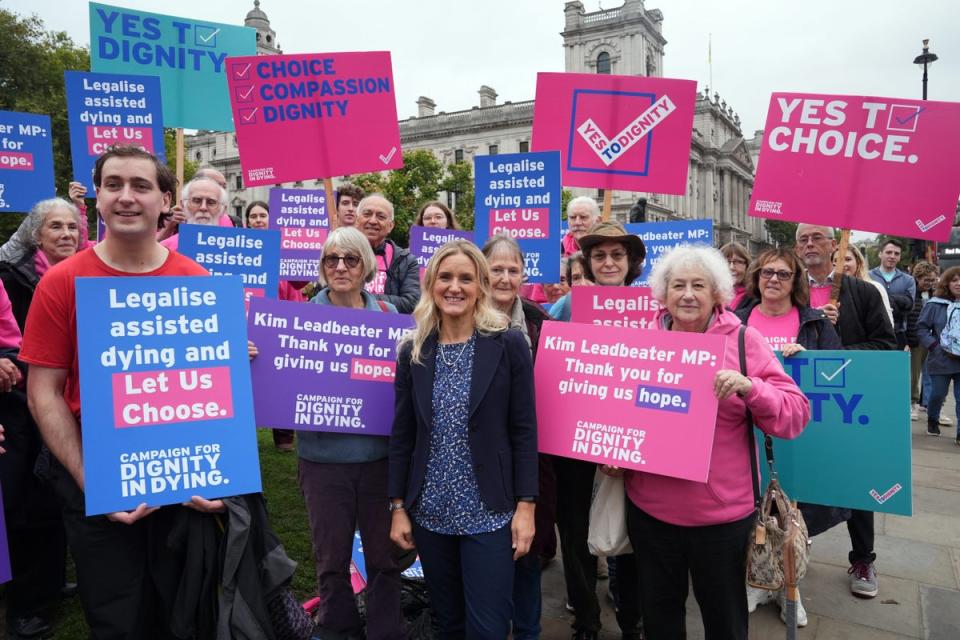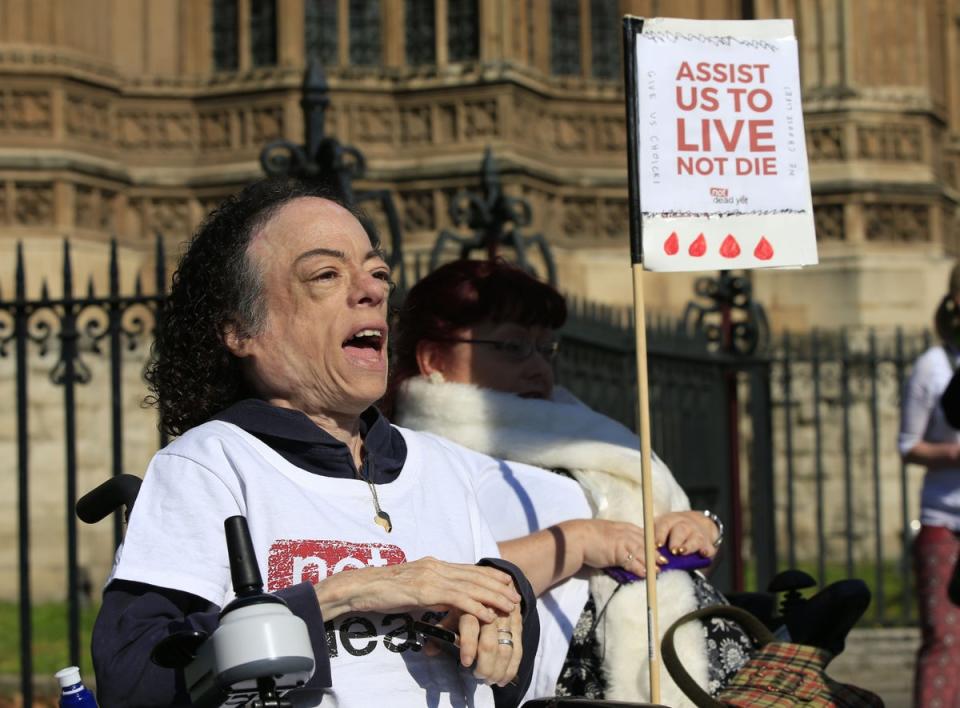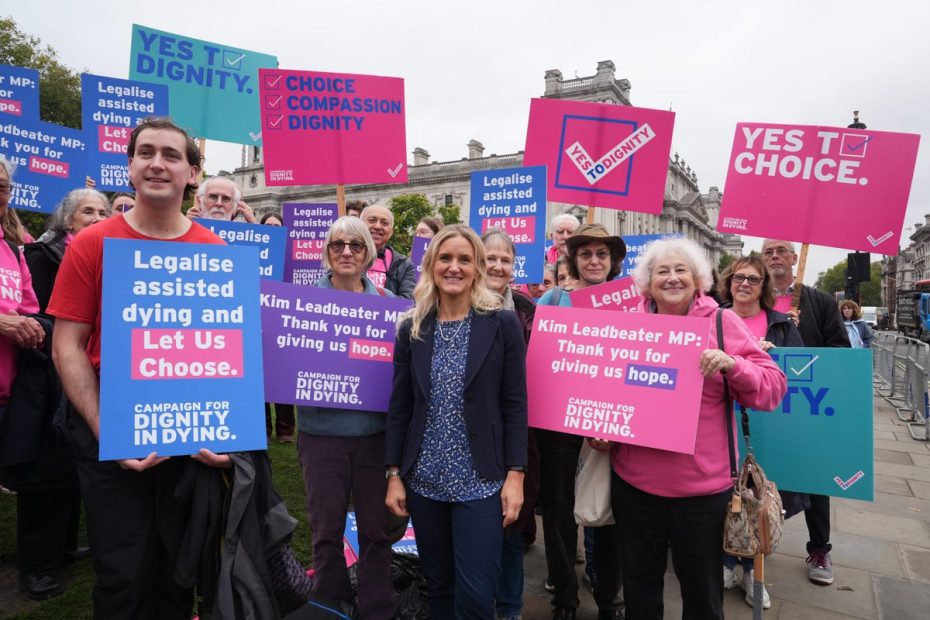A new law has been proposed to legalize assisted death for terminally ill adults in England and Wales.
Mentally competent adults with a life expectancy of six months or less who have a firm death wish approved by two doctors and the High Court could do so under proposed legislation for England and Wales.
Ahead of its publication on Tuesday, Labor MP Kim Leadbeater insisted her private member's bill would provide the “safest option” for mentally competent adults at the end of their lives.
She said the End of Life for Terminally Ill Adults Bill would make it illegal for anyone to persuade or induce someone to declare their intention to end their life through dishonesty, coercion or pressure to self-administer drugs to die. Anyone guilty of this risks a maximum prison sentence of fourteen years.
Critics claim the controversial legislation, which is likely to run to more than 40 pages, is being “rushed with indecent haste” and that MPs will not have sufficient time to scrutinize it before the November 29 debate.


Here we look at the details of the bill as it will be published.
What is assisted dying?
This, and the language used, varies depending on who you ask.
Advocates for change Dignity in Dying say assisted dying gives a person with a terminal condition the choice to control his or her death if he or she decides their suffering is unbearable.
They argue that dying terminally ill people and mentally competent adults deserve, in addition to good care, the choice to determine the time and manner of death themselves.
But campaign group Care Not Killing uses the terms 'assisted suicide' and 'euthanasia', saying the focus should be on 'promoting more and better palliative care' rather than any change in the law.
They say legalizing assisted dying could “put pressure on vulnerable people to end their lives for fear of being a financial, emotional or caring burden on others” and argue that disabled, elderly, ill or depressed people are particularly at risk.
What is the current law?
Assisted suicide is banned in England, Wales and Northern Ireland, with a maximum prison sentence of 14 years.
In Scotland it is not a specific criminal offence, but assisting in the death of someone can lead to someone being charged with murder or other criminal offences.
What's happening at Westminster?
Labor MP Kim Leadbeater formally introduced her bill in October to give terminally ill people freedom of choice at the end of life.
A debate and first vote are expected to take place on November 29.
If the bill passes the first stage in the House of Commons, it will move to the committee stage where MPs can table amendments, before facing further scrutiny and votes in both the House of Commons and the House of Lords, meaning any changes to the law would not be made. agreed until next year at the earliest.
Ms Leadbeater's bill would only apply to England and Wales.


What is on the invoice?
There are several requirements a person must meet to qualify under the proposed law.
The person must be an adult (18 years or over), resident in England and Wales and registered with a GP for at least 12 months.
They must have the mental capacity to make a choice about the end of their life and be considered to have expressed a clear, firm and informed wish – free from coercion or pressure – to end their life.
They must be terminally ill and expected to die within six months.
They must make two separate statements, witnessed and signed, about their wish to die.
The process should involve two independent doctors being satisfied that the person is eligible and allowing the clinicians to consult a specialist in the person's condition and, if necessary, obtain an assessment from a mental capacity expert.
A High Court judge must question at least one of the doctors on the application and may also question the dying person as well as anyone he or she deems appropriate.
There must be a minimum of seven days between the two doctors making their assessment and a further fourteen days after the judge has made a ruling, unless the person's death is expected shortly.
What guarantees are there?
It would be unlawful for someone to use pressure, coercion or dishonesty to induce someone to make a statement that they wanted to end their life, or to induce someone to self-administer an approved substance.
If someone is found guilty of any of these acts, they could face up to 14 years in prison.
Should doctors participate in the assisted dying service?
No. Doctors are not required to participate.
Doctors who do so must be satisfied that the person making the declaration of death has done so voluntarily and has not been coerced or pressured by anyone else.
They should also ensure that the person makes an informed choice, including raising awareness of their other treatment options, such as palliative care and hospice care.


Who would administer the medication?
The dying person must take the medicines themselves.
No doctor or anyone else can give the medication to the terminally ill person.
Will there be any research into the operation of the new law?
The chief medical officers in England and Wales and the Secretary of State for Health would be required to monitor and report on the operation of the law.
The Health Secretary should also report on the availability, quality and distribution of appropriate health care services for people with palliative care needs, including pain and symptom management, psychological support for those people and their families, and information about palliative care and how to manage it. gain access to it.
Has this issue been voted on before in Westminster?
Not for almost a decade. An Assisted Dying Bill, which would have given some terminally ill adults the ability to seek medical help to end their lives, was introduced to the House of Commons in 2015 and was rejected by MPs.
A bill was also proposed in the House of Lords during the 2021/2022 session, reaching its second reading in the chamber, while a Westminster Hall debate on assisted death took place in July 2022.
Are MPs assured of a vote on the bill next month?
No. These types of bills are known as private members' bills (PMBs) and are considered during the Friday sittings. The time available to discuss them is from 9:30 am to 2:30 pm.
If the debate is still ongoing at 2.30pm it will be postponed and the bill will be moved to the bottom of the list, meaning it is very unlikely that further progress will be made.
A closing motion can be submitted to shorten the debate and force a vote. It can be moved at any time during the procedure.
On Friday meetings, an MP who wants to table such a motion usually does so around 1 p.m. If approved, the House will then vote on whether to advance the bill to a second reading.
If it is rejected, the House will resume debate and the bill is unlikely to move forward.

